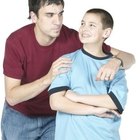
Physical punishment is a large part of our culture, but this does not mean it is best for children. While losing it once or twice and resorting to a smack might not be as detrimental, using physical tactics as regular punishment creates many issues. Discipline tactics is such as hitting, slapping and spanking reduce brain matter, cause declines in intelligence scores and verbal abilities, increase anxiety and aggression and are ineffective at stopping the behaviors long term.
Brain Changes
Physical harm does more than put a child at risk for things like broken bones and cuts, although these are certainly significant issues. Corporal punishment also reduces brain matter and causes declines in IQ, according to Harvard Medical School psychiatrist Akemi Tomodo in a study of 1,455 individuals published as, “Reduced Prefrontal Cortical Gray Matter Volume in Young Adults Exposed to Harsh Corporal Punishment“ in Neuroimage in 2010. It is likely that the fear and pain experienced by children causes the stress response to increase. This alters brain development when the energy is put into being on alert for danger instead of learning.
Declines in Verbal Ability
Children who are spanked regularly as a form of punishment have less verbal ability at age 5 then their counterparts who are not spanked. They also show more externalizing behaviors such as aggression, according to Columbia University professor Michael MacKenzie and his colleagues in a study of 4,200 children published as “Corporal Punishment and Child Behavioral and Cognitive Outcomes Through 5 Years-of-age” in Infant and Child Development in 2014. Those who are hit tend to have less ability to recognize sounds and more trouble speaking than those who are not physically punished, which may affect both academics and social functioning. Researchers encourage a step away from belts and smacks and toward other alternatives, which may include open discussion or "time ins" where parents sit with their children until they calm down and can be spoken to calmly.
Anxiety, Aggression and Social Development
Physical punishment leads to anxiety and aggression, says Duke University professor Jennifer Landsford and her colleagues in a study of 1,196 children published as “Corporal Punishment, Maternal Warmth, and Child Adjustment” in the Journal of Clinical and Adolescent Psychology in 2014. These behaviors can affect children at school and may get them into trouble or cause other children to avoid them, leading to social issues. Even when maternal warmth — like cuddling or other support behaviors — is high, these effects still occur in response to physical punishment. Embracing maternal warmth and support without the physical punishment may be more effective in increasing connection and providing children with a base for wanting to please the parent. This may reduce unwanted behaviors and lead to less anxiety and aggression overall.
Ineffective Punishment
Not only does hitting increase negative behaviors like aggression, but any amount of spanking is ineffective overall, notes University of Texas professor and researcher Elizabeth T. Gershoff in an article published as “We Know Enough Now to Stop Hitting Our Children” in Child Development Perspectives in 2014. While some children stop a behavior in the short term after a spanking, they are more likely to continue to do it in the long term, especially when parents are not around. Using discipline techniques that explain more concisely why these behaviors are wrong on a level other than, “Because you’ll get hurt if you do it,” is essential to stopping behaviors in the long term and reducing negative behaviors that increase with hitting.
Related Articles

How Absent Fathers Affect Men

How Does an Overbearing Mother Affect a ...

The Definition of Non-Cognitive Skills

How Poor Relationships Affect the Family

Signs of a Troubled Child

Traumatic Effects of a Bad Marriage on ...

Importance of the Brother Sister Bond

Psychological Effects of Fatherlessness

Chemicals That Stop Testosterone ...

How Exercise Increases Hair Growth

The History of School Uniform

Signs of Mental Abuse in Children

What Are the Benefits of Self ...

The Importance of Teenage Friendships

Disciplining Children in the 1950s

Effects on Girls Raised by Single ...

Types of Mother-Daughter Relationships

How to Communicate With the Strong ...

Aggressive Behavior in Adults

How to Be More Comfortable With ...
References
- Neuroimage: Reduced Prefrontal Cortical Gray Matter Volume in Young Adults Exposed to Harsh Corporal Punishment
- Infant and Child Development: Corporal Punishment and Child Behavioral and Cognitive Outcomes Through 5 Years-of-age: Evidence from a Contemporary Urban Birth Cohort Study
- Journal of Clinical and Adolescent Psychology: Corporal Punishment, Maternal Warmth, and Child Adjustment: A Longitudinal Study in Eight Countries
- Child Development Perspectives: Spanking and Child Development: We Know Enough Now To Stop Hitting Our Children
Writer Bio
Melody Causewell has been a writer in the mental health field since 2001. She written training manuals and clinical programs for mental health organizations. She has published feature articles "Leaven" magazine and has been published in "Natural Awakenings." She has a degree in psychology, a Masters degree in social work and is a La Leche League leader.
Photo Credits
Ableimages/Photodisc/Getty Images